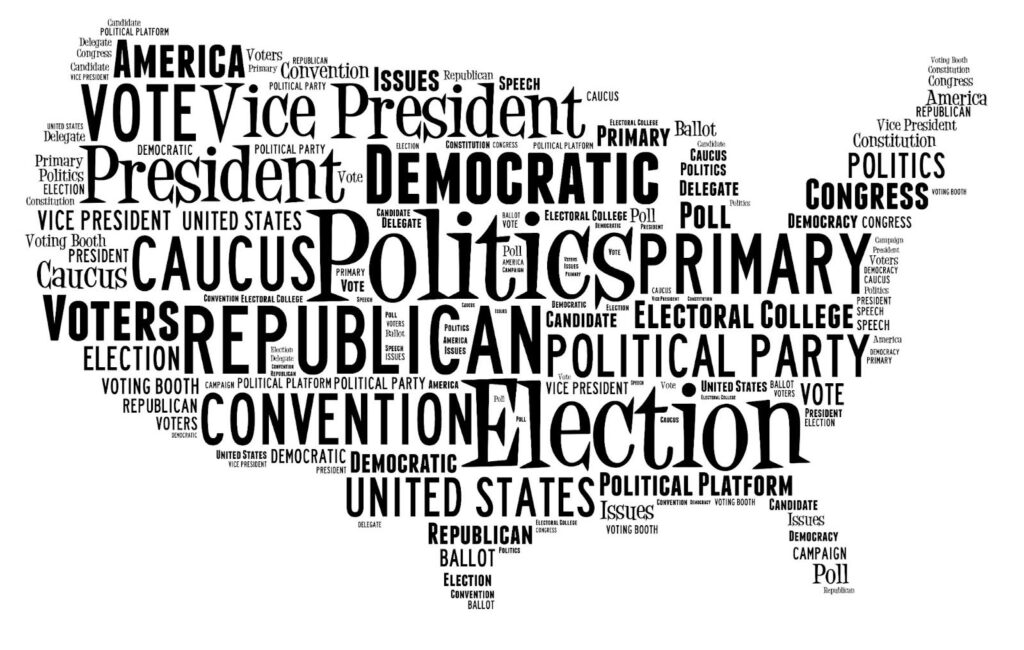
Why Language Matters in America’s Political Divide
Why does America feel so divided today? While issues like healthcare, education, and taxes are central, much of the political divide in America comes from something simpler: language.
When Americans misunderstand political terms, they often talk past one another. Words like socialism, woke, populism, or even democracy get thrown around without context. Instead of fostering debate, these buzzwords become weapons. Miscommunication fuels political polarization, deepens mistrust, and blocks progress.
At Republicans for Progress, our mission is to educate, define, and clarify. By understanding what these terms really mean, citizens can move beyond slogans and toward meaningful solutions.
What Is Polarization in Politics?
The question many Americans ask is: what is polarization in politics?
In simple terms, polarization means moving toward extremes. Citizens split into opposing camps with fewer people in the middle.
- Healthy polarization can sharpen debates and inspire reform.
- Toxic polarization turns opponents into enemies, where compromise is impossible.
- In the U.S., toxic polarization is often driven less by actual policy differences and more by the manipulation of political buzzwords.👉 According to research from the Journalist’s Resource at Harvard Kennedy School, media depictions of polarization strongly influence voter attitudes—making people believe society is more divided than it actually is. (Read study here)
How Misunderstanding Political Terms Fuels Division
1. The Buzzword Problem
Certain terms are constantly used in political speeches, campaigns, and media commentary. But when used incorrectly, they distort the debate.
- Socialism → Often used as a scare tactic, though America functions as a mixed-market economy with both capitalist and social programs.
- Woke → Originally meant social awareness of injustice, but has been rebranded by opponents as a negative insult.
- Critical Race Theory (CRT) → A specialized academic framework, yet misrepresented as something taught in all schools.
Populism vs. Democracy → Populism appeals to the majority’s emotions, while democracy safeguards minority rights. Confusing these concepts blurs accountability.
2. How Language Shapes Beliefs
Language doesn’t just describe politics—it creates perceptions. Misunderstood terms reinforce stereotypes and paint opponents as enemies.
For example:
- Calling Democrats “socialists” shuts down debate on healthcare reform.
- Branding moderates as “RINOs” (Republicans in Name Only) silences dissent inside the GOP.
- Misusing “patriotism” to mean blind loyalty to one leader divides communities further.
3. Why Clarity Matters
If Americans understood terms correctly, much of the hostility could disappear. Debates could shift from “us vs. them” to “what solutions work best?”
Commonly Misused Political Terms in America
| Term | Common Misuse | Accurate Meaning |
| Socialism | Any government policy that people disagree with | An economic system where the government controls production, not the U.S. model |
| Woke | An insult for being overly progressive | Awareness of racial, social, and economic injustice |
| Populism | Equal to democracy | A movement appealing to “the people,” sometimes undermining democratic safeguards |
| Critical Race Theory | Taught in K–12 schools nationwide | An academic framework studying systemic racism in law and institutions |
| Patriotism | Loyalty to one leader or party | Love of country, which may include criticizing it to improve it |
The Role of Media and Politicians in the Divide
Politicians often rely on political buzzwords misused for short-term gains. Emotional language energizes supporters, but it also spreads misinformation.
Media outlets, too, play a role. News channels frequently frame stories around conflict, which increases ratings but misleads the public about how divided we truly are.
This cycle of language shaping political beliefs in America creates echo chambers where opposing sides barely understand each other.
Bridging the Divide: What Can Be Done?
Here are steps to reduce misunderstanding and polarization:
- Educate on Definitions – Schools, civic groups, and nonprofits should provide resources for accurate political vocabulary.
- Encourage Fact-Checking – Citizens must verify sources and resist emotional manipulation.
- Promote Civil Dialogue – Respectful debates foster trust even in disagreement.
- Support Balanced Media – Media literacy training can help people spot spin and bias.
At Republicans for Progress, we provide clear definitions for misunderstood terms to help people engage in honest discussions.
Conclusion: Moving Toward Progress
America’s political divide isn’t only about policies—it’s about the language we use. Misunderstood terms like socialism, woke, or critical race theory keep citizens fighting over labels instead of solutions.
By learning accurate definitions, encouraging civil dialogue, and holding leaders accountable for their words, Americans can reduce division and move forward.
At Republicans for Progress, we believe in education, dialogue, and cooperation. Let’s return to the values of honesty, clarity, and progress.
👉 Ready to learn more?
Visit our Political Definitions or Contact Us to see how you can join the movement toward a more informed America.
FAQs on Misunderstood Political Terms
Q1: What does “woke” mean in politics?
Originally, “woke” meant being socially aware of injustice. Today, it is often misused as a political insult.
Q2: How does misunderstanding political terms cause division?
When terms are weaponized, people focus on labels instead of issues, fueling mistrust and deepening polarization.
Q3: Is populism the same as democracy?
No. Populism appeals to mass emotions, while democracy protects the rule of law and minority rights.
Q4: How can I avoid falling for political buzzwords?
Check definitions from credible sources, engage with multiple viewpoints, and fact-check before forming opinions.
Q5: What role does media play in political polarization?
Media often amplifies conflict for attention. Studies show coverage influences how divided voters think America is.